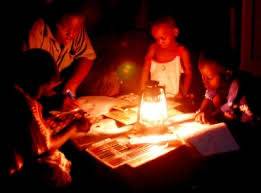# Must Ghanaians Brace for Worse in Electricity Supply?
As Ghana continues to navigate its energy landscape, the question of whether Ghanaians should brace for worse in electricity supply looms large. With the nation’s reliance on a mix of hydro, thermal, and renewable energy sources, fluctuations in supply have been a consistent concern. This article explores the factors influencing Ghana’s electricity supply and assesses the likelihood of future challenges.
## Historical Context
Ghana's electricity sector has undergone significant changes over the decades. The country initially relied heavily on hydroelectric power from the Akosombo Dam, which has been the backbone of its energy supply since its completion in 1965. However, increasing demand and climate change impacts have strained this system. The energy crisis of 2012, known locally as "Dumsor," highlighted the vulnerabilities in the supply chain, leading to widespread outages and public discontent.
## Current State of Electricity Supply
In recent years, Ghana has made strides to diversify its energy sources, incorporating thermal power plants and a growing interest in renewable energy. The government has invested in natural gas facilities and solar projects to reduce dependency on hydropower and improve overall supply stability. Despite these advancements, several issues persist.
### Demand vs. Supply
Ghana's population continues to grow, driving up electricity demand. The current installed capacity is often insufficient to meet peak demand, leading to intermittent supply. Factors contributing to this imbalance include:
1. **Aging Infrastructure**: Many power plants and transmission lines are outdated and require significant upgrades or replacements. The maintenance of these assets is often neglected due to financial constraints.
2. **Financial Challenges**: The energy sector faces substantial debt, impacting the operations of the Electricity Company of Ghana (ECG) and other utilities. This financial instability hampers their ability to invest in necessary infrastructure and technology.
3. **Dependence on Fuel Imports**: A significant portion of Ghana's thermal generation relies on imported natural gas. Fluctuations in international fuel prices and supply disruptions can exacerbate electricity shortages.
### Regulatory and Governance Issues
Regulatory inefficiencies and governance challenges further complicate the situation. Bureaucratic hurdles can delay the implementation of energy projects, while corruption can undermine public trust and investment in the sector. Addressing these issues is critical for ensuring a reliable electricity supply.
## Renewable Energy Potential
Ghana is well-positioned to harness renewable energy, particularly solar and wind. The government has set ambitious targets to increase the share of renewables in the energy mix. However, realizing this potential requires substantial investment, technological advancements, and robust policy frameworks. The Renewable Energy Act of 2011 was a positive step, but effective implementation remains a challenge.
### The Role of International Partnerships
International partnerships and investments play a crucial role in enhancing Ghana’s energy infrastructure. Collaborations with foreign entities can facilitate technology transfer, capacity building, and financial support for large-scale projects. The government’s commitment to creating a conducive environment for foreign investments is essential to boost confidence in the sector.
## Climate Change Impacts
Climate change presents additional challenges to Ghana’s electricity supply. Variability in rainfall affects hydropower generation, and increased temperatures can drive up energy consumption. The nation must adapt to these changes by investing in climate-resilient infrastructure and diversifying its energy sources to mitigate the impacts of extreme weather.
## Future Outlook
Given the current trajectory, Ghanaians may indeed need to brace for potential challenges in electricity supply. While there are promising developments in renewable energy and infrastructure investment, significant hurdles remain:
1. **Financial Sustainability**: The energy sector's financial health is paramount. Without addressing the underlying debt issues and ensuring that tariffs reflect the cost of production, the sector may struggle to meet future demand.
2. **Infrastructure Development**: Timely investments in both generation and transmission infrastructure are critical. Delays in project implementation can lead to supply shortfalls during peak demand periods.
3. **Policy Consistency**: The government must provide a stable policy environment that encourages investment and innovation in the energy sector. Frequent changes in regulation can deter potential investors.
4. **Public Engagement**: Engaging the public in energy conservation efforts and increasing awareness about energy efficiency can help manage demand and reduce pressure on the grid.
## Conclusion
While Ghana has made significant strides in diversifying its energy supply, the potential for future challenges remains. Factors such as infrastructure deficits, financial instability, and climate change are critical issues that must be addressed to ensure a stable and reliable electricity supply. Ghanaians may need to brace for tougher times ahead unless proactive measures are taken to strengthen the energy sector.
In summary, while the outlook is not entirely bleak, the urgency for reforms and strategic investments cannot be overstated. The collective efforts of the government, private sector, and the public will be essential in steering Ghana towards a more resilient and sustainable energy future.


